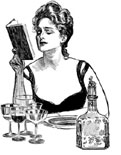
Jesus in the Dictionary
LETTER FROM ENGLAND
Can dictionaries engender controversy? They certainly can in England — from Dr. Johnson’s definition of oats (“a grain, which in England is generally given to horses, but in Scotland supports the people”) to the just published New Shorter Oxford English Dictionary‘s entry for Jesus, who is defined as “the central figure of the Christian faith, a Jewish preacher (c 5 BC – c 30 AD) regarded by his followers as the Son of God and God incarnate.” In providing examples of usage, the new edition eschews quotations from the classic hymnology of Charles Wesley and instead cites “Jesus freak” and “Jesus! he cried, I’m glad to be here.”
The result has been a flap of major proportions. For example, Tony Higton, a senior evangelical and clerical member of the Anglican General Synod, was not pleased with the dictionary’s definition of “Jesus freak.” Also, he declared: “They have used almost as many words to define the blasphemous use of it [‘Jesus! he cried, I’m glad…’] as the theological, historical definition. I also find the idea of Jesus as a ‘Jewish preacher’ to be a rather derogatory term.” A Lambeth Palace spokesman was no less disturbed; said he: “It is deeply regrettable that the examples given emphasise the negative use of the word, and that there are no positive ones such as ‘Jesus Lives’ or ‘Through Jesus Christ our Lord.'”
To which the General Editor of the £3 million, 13-year project, Alan M. Hughes, replied in a letter to The Times (Oct. 15, 1993): “Since many speakers of English are not Christians, we aimed at a wording that does not assume a Christian faith on the part of a reader, and is equally valid for a Muslim, a Jew, or an atheist.”
You May Also Enjoy
The NEW OXFORD REVIEW is over 20 years old now, and we’ve always operated on…
America magazine bellyaches about how Catholicism has historically expelled "heretical Christians" from its midst.
Victim status is highly coveted in our effete culture.

